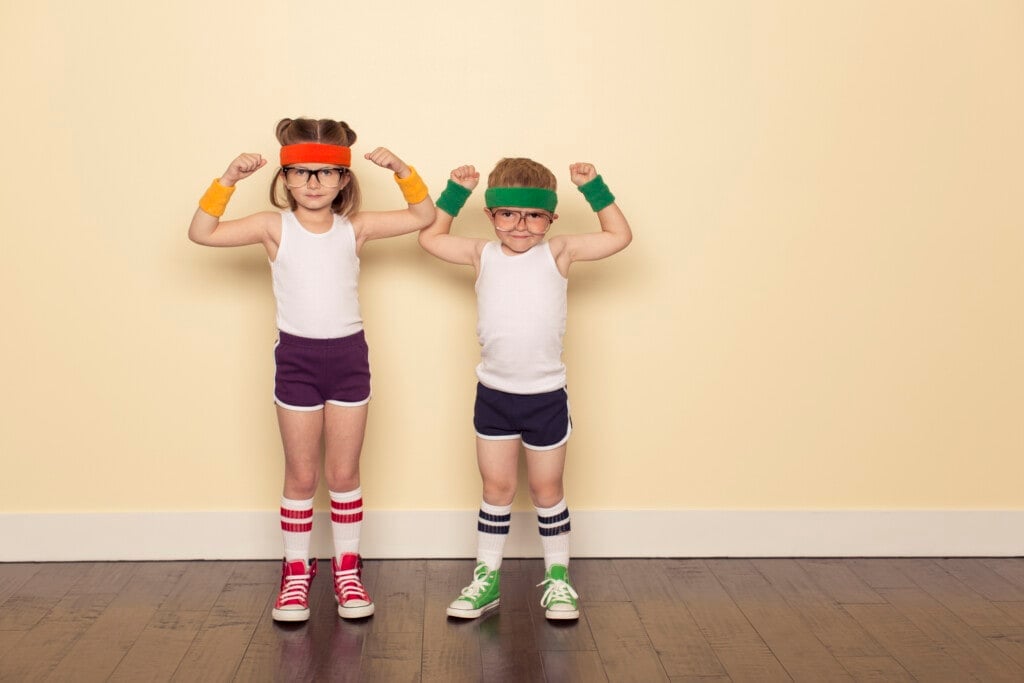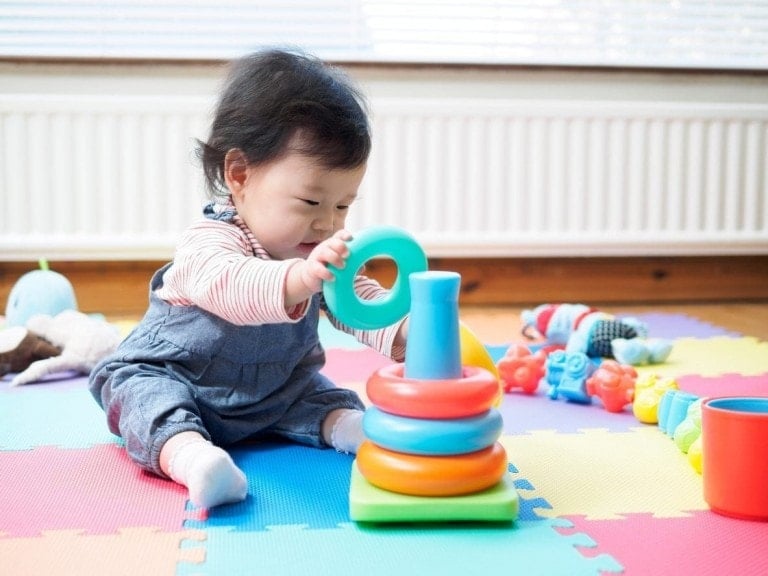Body image can be a tricky subject for many of us. There is no concrete definition, but generally, the concept refers to how you think about your body and feel within your skin — your attitudes, assumptions, memories, and experiences of your height, weight, shape, and overall appearance.3 Growing up, I had a hard time around puberty, much like everyone else. But I don’t remember my parents ever really talking about body image.
I also don’t recall it being a thing in the ’80s and ’90s to focus on a healthy body image. In the age when we were getting hit with the low-fat craze and aspiring to crazy ideals, it was hard not to be down on ourselves. I still internalize this sometimes and place too much emphasis on the scale. But I have learned to relax more about it since having kids.
Accepting myself is vital in showing my kids how to deal with their body image. If I’m always down on myself about my body or make disparaging remarks about myself, they will pick up on this and find a way to apply it to themselves. Kids are little sponges who love to repeat everything we say. We can do certain things to help our kids with body image and add to their confidence.
The Importance of a Positive Body Image
How you look at your body will impact you for your entire life. It has a long-term impact on mental health, weight, and physical health.1 It has been noted that body image conversations and body dissatisfaction can be seen as early as toddlers and progress as they age, so monitoring your reactions to your own and others’ bodies is essential.5
If you have a negative body image, you are at higher risk for eating disorders, low self-esteem, and depression.6 A positive body image can help with your confidence, and you may feel better about your place in the world. We want our kids to be happy, healthy, and confident in themselves, so a positive body image is essential.
Do’s and Don’ts of Discussing Body Image
Here are some things you should (and shouldn’t) do when discussing body image with your kids:
Do: Set a Good Example and Be Mindful
The most important thing you can do for your kids is to set a good example. If you comment about your body or say that you can’t eat certain foods, it will teach them to look at their bodies that way. I used to let myself get into a huge funk whenever I saw a number on the scale that I didn’t like. Instead of being down on myself, I’m working on focusing on the positive. This teaches my kids how to do this, too. It helps with their concept of body image, and I’m also rewiring my own. Being mindful of how I view myself and what I say within earshot is critical in helping my kids have the same body positivity.
Don’t: Use “Fat Talk”
Making indirect comments about your child’s or others’ body or weight can be hurtful.1 Even saying that you shouldn’t eat something the rest of the week because of how you just ate can damage your child’s body image. They will apply how you talk about yourself to themselves. Your child can also pick up on your tone and nonverbal cues when talking about how it’s good or bad that someone lost weight.
Do: Let Your Child Come to You With Their Concerns
Being open to discussing body image is helpful, and you should let your child know that they can come to you with concerns about their own body. It is normal for kids to bring this up when they hit puberty or when their bodies start changing.2 If or when they want to discuss their body, listen to their concerns and respond with compassion. You can even offer to do some exercises together so your kids don’t feel alone.
Do: Be Careful How You Talk About Their Body (And Others’ Bodies)
It’s essential that your child doesn’t receive compliments, criticisms, or general comments about their body. You don’t want them to put their self-worth or self-esteem in their appearance, so avoid saying things like, “Wow, you are growing so big!” or “Don’t you look pretty today?!” Instead, focus on their achievements, efforts, or attributes, such as, “I can see how hard you tried!” or “You have such an interesting way of looking at the world!” Also, try to avoid making comments about other people’s bodies.2 Your kids will hear you and can internalize these messages.
Don’t: Demonize Certain Foods
Many of us tend to think of foods in absolutes. For example, sugar is bad, and vegetables are good. By viewing foods this way, we give them power over us and set ourselves up to feel terrible when we eat the “bad” foods. You can explain that certain foods are treats for a reason and are okay to have sometimes. I will remind my kids that eating regular foods is essential because eating only treats can make your body feel bad and lead to a sugar crash. Instead of telling them that certain foods make them fat, I focus on how foods make them feel.
Do: Explain That the Media Isn’t Always Truthful
The impact of the media can influence how we perceive our bodies.2,7,8 It can get in our heads about how we don’t look as perfect as people on the cover of magazines. By explaining to kids that these photos are created to sell products and are modified to make even celebrities look better, they will see that these images aren’t authentic. Let kids know these photos aren’t what these models or celebrities look like in real life. This idea pertains to celebrities and the highlight reel pictures we see of our friends, family, and acquaintances on social media.8
How To Encourage a Healthy Body Image
Even if you haven’t been mindful of these issues in the past, it’s never too late to change! You can follow these tips to promote a healthy body image in your household:
Encourage Activity From a Positive Angle
Movement is essential to health, but how you introduce it to them is critical. Instead of forcing the idea of working out on your kids, find things they like to do. When you enjoy your exercise, you often want to do it instead of feeling like you have to. The same is true for your kids. You could also join in and do something together, like yoga or going for walks, to help build some of these good exercise habits.
Enable Healthy Eating
In one study from the Professional Association for Childcare and Early Years, 19% of early years practitioners said they’ve witnessed kids refuse food because they believed it would make them fat.5 This is why it’s important not to demonize foods. However, you should also have plenty of healthy choices for your kids to pick from. Encouraging them to make their own decisions about food and nutrition will help them learn how to fuel their bodies best.
Talk to Them About Development
Since children are still growing, help them understand that this growth and weight gain are normal parts of development. This is especially true when they’re going through puberty.3 It’s essential to help them navigate any feelings of shame or embarrassment about their growing bodies.9
Fostering a positive body image in our kids is one of the best tools we can give them to navigate this world effectively. It’s natural to look at others and compare, but if they have confidence in their bodies, it may not affect them as much. The biggest thing we can do is set a good example for eating and movement and eliminate as much negative self-talk as possible. These habits may be hard to break, but our kids (and we parents) will surely benefit.










